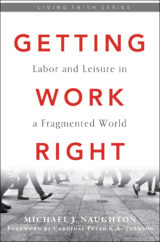By Michael Naughton
Dr. Michael Naughton is the director of the Center for Catholic Studies at the University of St. Thomas (Minnesota). He holds the Koch Chair in Catholic Studies and is a full professor in the department of Catholic Studies. Dr. Naughton also serves as board chair for Reell Precision Manufacturing. He helped coordinate and write the Vocation of the Business Leader issued by the Dicastery for Promoting Integral Human Development, which has been translated in over fifteen languages. He is the author, co-author, and co-editor of ten books and over fifty articles, including Getting Work Right: Labor and Leisure in a Fragmented World.

I grew up in the 1960s and 70s on the South Side of Chicago in a blue-collar neighborhood. One of the more dramatic moments of my teenage life occurred one Saturday night when four other teenagers from a local Catholic high school jumped me. The beating took place in front of the church our family attended.
The next morning, when our family went to Mass at that same church, I saw one of my assailants. Filled with self-righteous anger, I announced to my parents when I got home that I was never entering that church or any other Catholic Church—“so full of hypocrites”—again.
My mother, who was from Ireland, responded as only a mother to a teenage son would, “Michael, you know, there is always room for one more hypocrite.”
This was not what I wanted to hear. I was the victim. I was the peace-loving kid. I was the person who wouldn’t hurt a fly. But I was also, and unfortunately still am, a hypocrite.
My mother wanted me to learn a very important lesson in self-knowledge: namely, that when we think of sin or hypocrisy, our first thought should be of ourselves.
Of course, we would prefer to think of other people’s failings—greedy business people, pompous professors, bureaucratic administrators. Focusing on other people’s sins instead of our own is a comfortable approach to life, since it demands little change from us. It allows us to keep our sins secret, private, and unacknowledged.
Yet, in our honest moments we experience the gap between who we have been created to be and who we actually are right now. This gap—what we call sin and hypocrisy—takes on multiple expressions, but one dimension that none of us escape is the problem of the divided life.
As is true of most failings, we see the divided life more clearly in others than in ourselves. The Second Vatican Council describes the divided life as “the split between the faith which many profess and their daily lives.” This split creates a false opposition between public and private spheres, faith and reason, professional and religious life. The Council explains that this split and divide “deserves to be counted among the more serious errors of our age.”
There are many reasons for the divided life, but one very important root of the problem involves the split between the active and contemplative life. We were created both to work and to rest, both to be active and to be contemplative. These two dimensions of our lives are meant to inform each other as part of a deeper integrated whole rather than exist as two modes of being that balance each other.
Many of us suffer from a lack of awareness of this divide. We think we “have integrity,” and parrot the trite slogans of the culture, “I do what I say and say what I do.” Too often, what we have is a cheap integrity. Smug and self-righteous of our own achievements, we are about as deep as a puddle. We want a simple resolution, but what we really need is a rescue.
We prefer to take the easy route to dealing with the problem of the divided life, so we use phrases such as “work/life balance” as though some sort of planned program will be able to solve this fundamental problem of the human condition. “Balance” has become one of those overused words in the workplace vocabulary. While it has its place, the “balance of work and life” will often perpetuate, rather than confront and overcome, the divided life.
Balance is an attempt to manage something in a calculative way by weighing options and putting more on one side or the other of the scale. It is a typical achiever response. We are seduced by the idea—usually unexamined—that we can manage our life through our calculations and achievements, that these alone can lead to deep satisfaction, happiness, and integrity. This is a serious error. We think we can get work right without getting rest right, but we can’t.
What we need is not more achieving, but rather a posture of receiving—of silence, prayer, rest, of keeping Sunday as a day of worship, living in covenanted relationship—a receiving that will open ourselves to the woundedness of our own efforts at work, leadership, business, and production. It is here that we move beyond balance to a profound integration where the contemplative life begins to inform, correct, complement and penetrate our work.
So our way out of the divided life will only come from the reception of a kind of grace, one that moves us beyond balance toward integrity. This is why at the heart of overcoming a divided life is an integrated life informed by the theological virtue of charity. Pope Benedict XVI defines charity as “love received and given.” As gift, as grace, charity is first received. Charity begins the healing of the divided life by revealing the truth that the contemplative life of prayer and worship provides the context for rightly receiving reality, listening into the being of things. What is first received in silence, prayer worship can then be given to others in profound ways in our active and work lives.
This is why Benedict identifies charity as the key virtue for Catholic social teachings, since is connects the active life, especially in the professional, economic and political fields, with the contemplative expressions found in prayer and worship. It is precisely at this intersection of the contemplative and the active that integrity can be fostered.
So if we are to get our work right we have to get rest and the contemplative life right.
You Might Also Like

The divided life is a temptation so built into our society, we may not even recognize it. Yet most of us fall prey to it. We either undervalue work, resenting it as simply a job, or we overvalue it as an identity-defining career. Michael Naughton, drawing on his background in both business and theology, proposes that the key to finding balance is another important human activity: leisure. In light of leisure—not mere amusement, but time for family, silence, prayer, and above all, worship—work becomes a space where men and women can find deep fulfillment. Naughton provides real-world examples of how businesses can promote authentic human flourishing and innovation through practices and policies that support leisure.
In Getting Work Right Michael Naughton will change how you work—and rest.